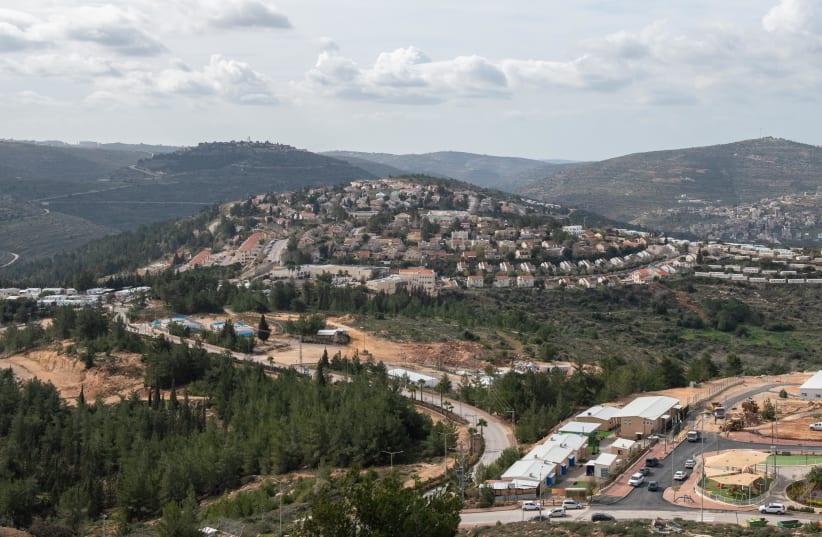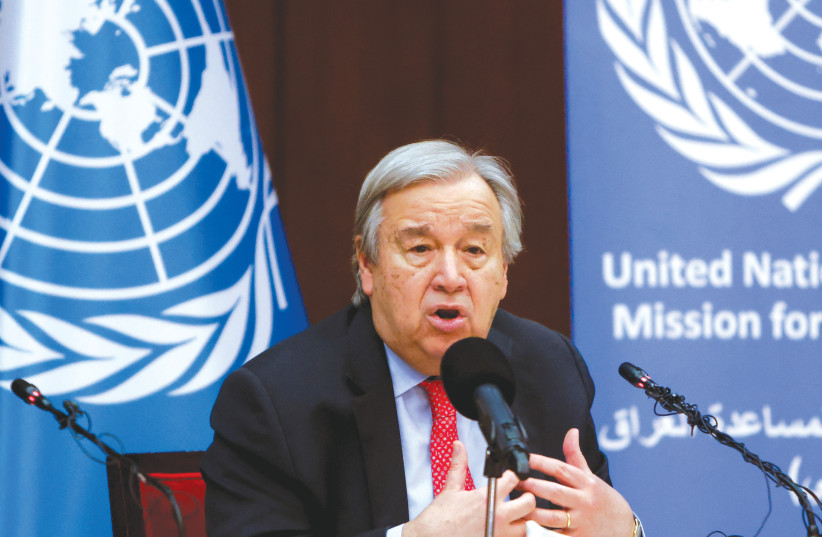On Wednesday, United Nations Secretary-General Antonio Guterres issued a statement furiously condemning Israel’s advancement of several thousand new homes in the West Bank.
“The Secretary-General reiterates that settlements are a flagrant violation of international law and relevant United Nations resolutions,” said his spokesman, Farhan Haq.
“Israel’s persistent expansion of its settlements in the occupied West Bank, including east Jerusalem, deepens humanitarian needs, significantly fuels violence, increases the risk of confrontation, further entrenches the occupation, and undermines the right of the Palestinian people to self-determination.”
There are compelling arguments in favor of Israel’s construction of homes in the West Bank and there are compelling arguments against it.
Proponents will say that Jews should be able to live throughout their ancestral homeland, that the settlement of Jews in Judea and Samaria rights the historic wrong of their having been barred from that land when it was under foreign occupation, that Israeli communities represent a last line of defense against hostile forces, and that they are necessary for both Israel’s security and claim to the land.
Opponents will say – as Guterres did – that the expansion of Israeli communities represents a violation of international law, that it limits the land available for a future Palestinian state, that it further enmeshes the two peoples in ways that will make it more difficult to disentangle them in the future, that it endangers Israeli security forces and civilians unnecessarily, that it antagonizes Palestinians and weakens moderate forces in Palestinian society, and that it makes a peaceful resolution of the conflict much more difficult to come by.
An ongoing debate
There has been an ongoing debate involving all these arguments and others raging within Israeli society and among those engaged in Middle East politics for decades. It is a critical debate and Guterres is as entitled to express a position on the matter as is anyone else.
There is one claim, however, that we must oppose with all our might: namely, that the construction of homes for Israeli families “significantly fuels violence.”
Palestinian terrorists have never wanted for pretexts to attack Jews.
In 1929, it was the presence of Jews at the Western Wall – the retaining wall of the Temple Mount complex, Judaism’s most sacred site – that was used as a rallying cry by the antisemitic mufti of Jerusalem, Hajj Amin al-Husseini, to incite the mobs that murdered dozens of Jews in Hebron and throughout the land.
In 1936, as former Jerusalem Post reporter Oren Kessler documents in his book, Palestine 1936, it was the immigration of Jews to Palestine and their purchase of local land that was exploited by the leaders of the Arab revolt that claimed the lives of hundreds of Jews.
In 1947 and 1948, it was the formation of the Jewish national home that served the commanders of the Arab irregular forces that attacked Jews and destroyed Jewish property in an effort to prevent the State of Israel from coming into being.
And today it is the construction of homes for Israeli families in the Jewish heartland that Palestinian terrorist groups use as an excuse to murder Jews in their homes, on the roads, in their synagogues, and elsewhere.
If it were true that the construction of homes causes violence, it would follow logically that the absence of such construction should bring about a lull in that violence. But the 10-month settlement freeze declared by Prime Minister Benjamin Netanyahu and his government in November 2009 did no such thing.
Numerous Israelis, both soldiers and civilians, were murdered by Palestinian terrorists during that period, and the Palestinian leadership came up with one excuse after another to refuse to come to the negotiating table.
What drives Palestinian terrorism is the persistent refusal to countenance any sovereign Jewish presence in this land, the hatred and dehumanization of Jews, the ongoing incitement to violence in Palestinian schools and mosques, and the Palestinian Authority’s incentivization of terrorism by means of financial inducements and rewards.
So, no, Mr. Secretary-General. Jewish homes do not cause violence. Terrorists cause violence. And to compare the construction of homes to the wanton murder of innocent civilians is to engage in a stunning perversion of basic morality that brings shame to the UN and to your office.

